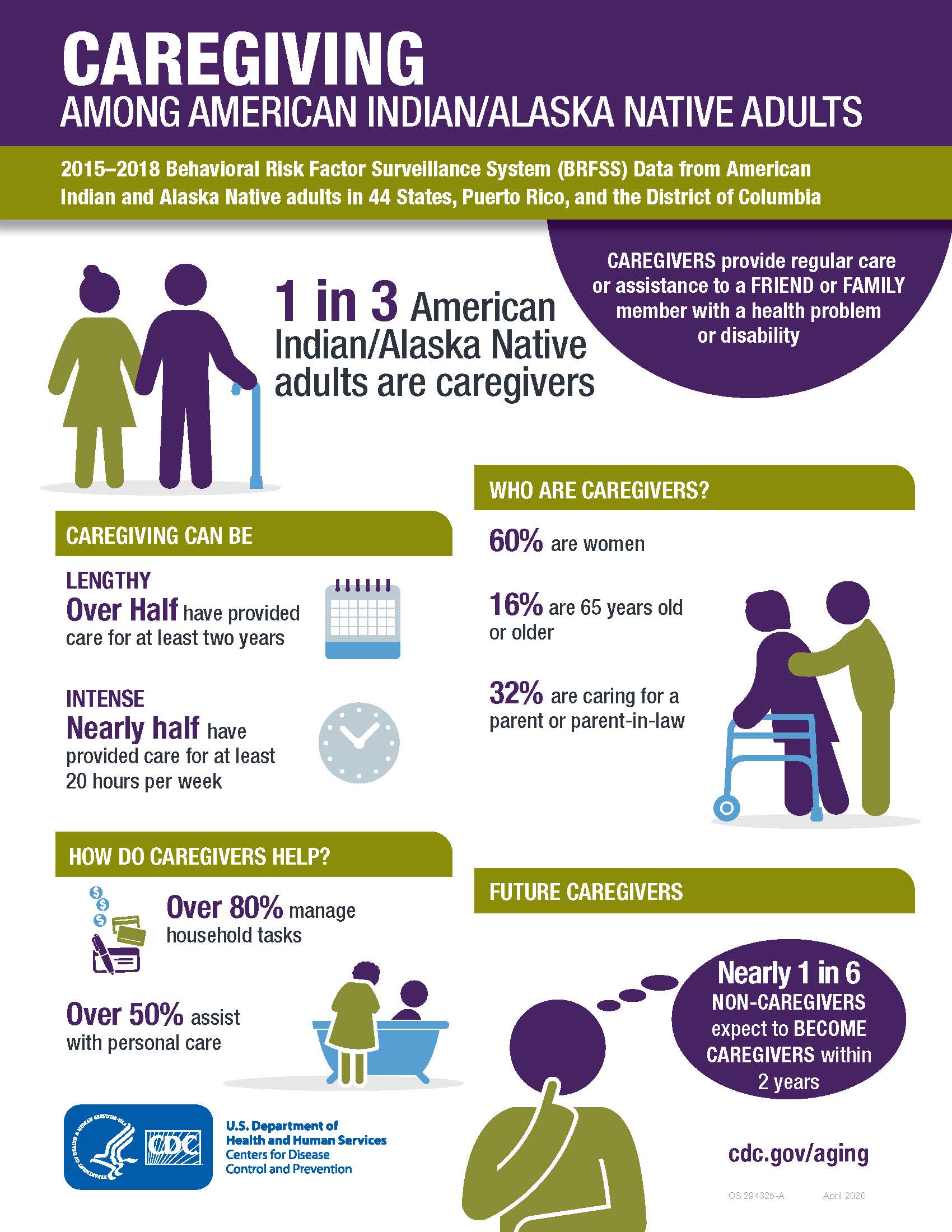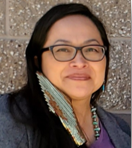In November, we celebrate National Family Caregivers Month to highlight those who give their all to help their loved ones. A caregiver is a person who provides care and assistance to someone who is experiencing health issues or has a disability. Family caregivers are different from doctors or nurses because they are usually unpaid family members who provide the primary source of care.
Taking care of family is part of everyday life in tribal communities, yet the work of caregivers is not always recognized or valued enough. Most of the time, women like moms, daughters, aunts, or grandmothers are the primary caregivers. According to “Aging in America” from the Institute of Aging, about three out of four caregivers are women. Young people are also expected to care for their older family members in many families.
Being a caregiver is hard work, as they help with medicine, wound care, and medical tools. Most caregivers must learn to do these things independently without taking a class or getting formal training. A 2012 report from the American Association of Retired Persons, “Home alone: Family caregivers providing complex chronic care,” shows that half of all caregivers provide medical care.
In 2012, Cordova-Marks et al. surveyed female caregivers living on the Hopi Reservation in northern Arizona. Listed below are highlights of some of the characteristics of the caregivers surveyed:
- Most care for parents or grandparents (84%)
- They mainly help with rides (93%), housework (93%), and medical care (73%)
- Challenges include lack of personal time (61%), financial stress (75%), and overall stress (46%)
- 77% want more caregiver training
- 77% would not consider assisted living for their relatives
- Most caregivers reported attending cultural ceremonies (84%) and using traditional healers (56%)
Caregivers in remote places face further obstacles because living far from hospitals or clinics means they cannot always get the medical help they need immediately. Rural caregivers often drive long hours to medical appointments, pharmacies, or rehabilitation centers. They are also responsible for giving medications, including injections, and medical interpretation.
Tribal communities are resilient and strong. They develop new ideas, such as using tools like video calls with nurses or doctors to help, and they support each other. Tribal communities also have ways of healing and caring for health through storytelling, traditional physical activities, or ceremonies, which work alongside modern medicine. Participating in cultural practices provides social connection and holistic healing.
Please join the Office of Clinical and Preventive Services this and every month in identifying and prioritizing caregiver needs. Health care staff in local communities are in the best position to figure out how we can best partner with families, patients, providers, and communities to raise the physical, mental, social, and spiritual health of American Indians and Alaskan Natives to the highest level.
How is the Indian Health Service supporting caregivers?
The IHS Alzheimer’s Grant Program is working to help family caregivers by creating programs to assist tribes and urban Indian organizations in developing models of care in their local communities.
Dementia Models of Care
The Indian Health Service Alzheimer’s Grant Program within the Office of Clinical and Preventive Services is working with tribes and urban Indian organizations to create models of dementia care that can help meet the needs of tribal communities. By working with local communities, the IHS hopes to create culturally sensitive and effective models of care that will improve the lives of those living with dementia and their caregivers. The ultimate goal is to develop sustainable models of care that can continue to help tribal communities in the future.
Extension for Community Healthcare Outcomes-Caregiver Support Sessions
In 2023, the IHS Alzheimer’s Grant Program partnered with the Northwest Portland Area Indian Health Board’s Indian Country Extension for Community Healthcare Outcomes Program to start two ECHO programs focused on dementia. The Clinical Dementia ECHO is designed for medical professionals, and the Dementia Caregiver Support ECHO is for people who help care for individuals living with dementia. These ECHOs can be joined by anyone from the IHS, tribal, and urban Indian organizations who help families caring for someone with dementia or a chronic health issue. The goal is to give them help and resources.
The Dementia Caregiver Support ECHO happens on the 4th Thursday of the month at 11 a.m. PT. Click here or more information.National Advisory Councils
The IHS elder health team serves on the Recognize, Assist, Include, Support, and Engage (RAISE) Family Caregiving Act Council and the Supporting Grandparents Raising Grandchildren (SGRG) Act Council, coordinated by the Administration for Community Living. The elder health team offers insights and contributions to the 2022 National Strategy to Support Family Caregivers, aiming to assist and empower family caregivers. This participation is important in shaping meaningful support measures for those who care for their loved ones.
Join our Elder Care LISTSERV to stay connected.




